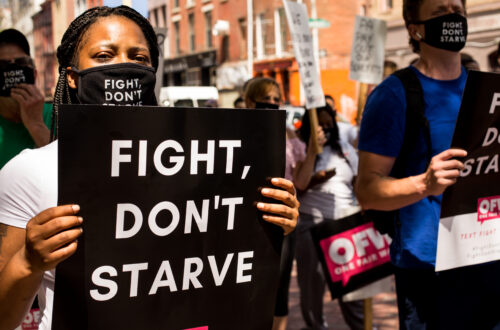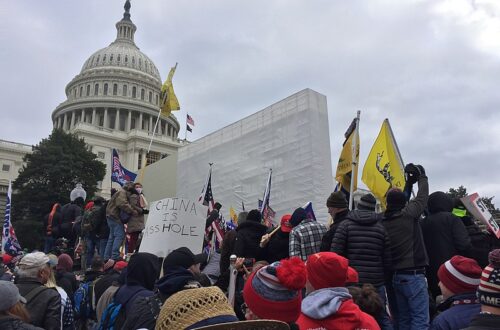Since the birth of America, free speech has existed in a gray area. More a symbol of individual freedom than a clearly defined law, freedom of speech has been the star of numerous Supreme Court cases.
Amid ongoing ambiguity, the courts have come to share their daunting task of interpreting the bounds of free speech with an unlikely partner: Big Tech. The actions of companies like Facebook, Twitter and Google have come under immense scrutiny – particularly by members of the Republican Party.
Florida Governor Ron DeSantis voiced concern that Big Tech’s recent censorship of Donald Trump’s social media and widespread refusal to host the Parler app are signs that Big Tech has “changed from neutral platforms to enforcers of preferred narratives.”
To supplement his complaints, he endorsed the proposed Transparency in Technology Act. Among other things, that act would allow users to sue social media platforms for inconsistent standards applications and prohibit platforms from arbitrarily deplatforming users.
This bill offers a series of long-overdue regulatory actions for Big Tech. In the context of highly unregulated platforms such as Facebook, Google and Amazon, some parts of this legislation are important.
The Transparency in Technology Act is supplementary to Section 230 of the Communications Decency Act. In essence, Section 230 is a key portion of a 1996 bill that protects technology companies from legal battles arising from publications of third-party content. In simpler terms, it allows free speech online by letting a company like Facebook shift the blame for hateful or violent groups away from itself.
In recent years, Section 230 has been criticized as outdated and misused by larger-than-life technology companies that could not yet have been conceptualized in 1996.
The sections of the Transparency in Technology Act that target Big Tech’s monopolistic business practices and demand transparency echo popular cries from both sides of the aisle.
However, sections of the bill that require notice to ban destructive users and generally discourage de-platforming users are baseless, vindictive retaliations for the recent censorship of Trump.
DeSantis labels Big Tech as the enemy; whose enemy is it actually? Is it the enemy of violent groups that want to overthrow their government? Is it the enemy of those spreading disinformation about the recent election? These are the users who face potential censorship – are they the ones DeSantis is trying to protect?
DeSantis’s rhetoric is part of a common rallying cry accusing Big Tech of restraining conservative platforms. This accusation itself is a disinformation campaign. A recent report found that no trustworthy, large scale study has found evidence of conservative content being censored for ideological purposes nor any manipulated searches that favor liberal interests.
Big Tech is not targeting conservatives. It is targeting liars, demagogues and self-proclaimed saviors of white supremacy. That is not a political agenda nor an attack on free speech.
Rather, this is an extension of the precedents set by Supreme Court cases like Schenck v. U.S. prohibiting speech that “…incites actions that would harm others.” Yes, there is a line that should not be crossed when regulating free speech. Condemning those who share invitations to an insurrection that resulted in the death of five people is perfectly legal under the Supreme Court’s interpretation of free speech.
Do not be fooled by DeSantis’s selfish crusade against companies doing damage control in response to hundreds of posts on Parler that “incite and encourage violence.” He says “you don’t like it, don’t read it.” Ignoring the problem never solves it; we saw that clearly on Jan. 6, and we are reminded of it every day by Florida’s continuous explosion of COVID-19 cases.
While DeSantis eagerly ignores the problems posed by Parler, he has not ignored Twitter’s banning of Trump. Something tells me that when it comes to Twitter, he would not respond well to being told, “you don’t like it, don’t read it.”
DeSantis identifies with a party that consistently condemns government intervention and regulation of companies yet deems himself worthy of determining what should and should not be allowed online. He advocates for unchecked free speech at the expense of private companies’ autonomy. So, let’s rephrase: he is OK with government control over private companies when it caters to his interests.
This frenzy to regulate Big Tech’s power has understandable origins. Preventing monopolistic dominance and manipulative business practices is fair; it demands that companies regulate their platform. Yet, now DeSantis wants to selectively regulate the business, preserving freedom of speech and preventing Big Tech’s regulation of their platforms, where he perceives it to be outside of his interest.
Like many situations, the logical concept of Big Tech regulation has become incredibly convoluted with political involvement, interests, and rivalries. Only one thing remains clear: freedom of speech is not under attack; disinformation, violence and the spread of hate are.
Featured image: Logos of Big Technology companies that are facing criticism. (All logos in this picture are used under creative commons licenses. Licenses are as follows: Google, Amazon, & Twitter: https://bit.ly/2YRWHj8. Apple: https://bit.ly/2MLZUhP. Facebook: https://bit.ly/3aLKnGG)
Check out other recent articles from the Florida Political Review here.





